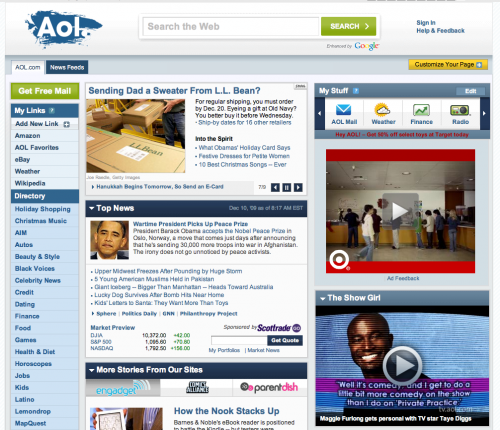AOL Returns As Independent Company, Search Decision Looms
Yesterday was the first day of trading for the “new” AOL, an independent company with a market cap of $2.5 billion dollars. When AOL “bought” TimeWarner a decade ago in an all-stock transaction worth $182 billion there was a near consensus that the combined company represented the future of media and publishing. It made a […]
Yesterday was the first day of trading for the “new” AOL, an independent company with a market cap of $2.5 billion dollars. When AOL “bought” TimeWarner a decade ago in an all-stock transaction worth $182 billion there was a near consensus that the combined company represented the future of media and publishing. It made a lot of sense — conceptually. But the marriage never worked out and AOL saw its fortunes decline literally and figuratively as newer companies ascended over the last 10 years.
Now, with former Googler Tim Armstrong at the helm, the company’s independent strategy is focused on “premium content,” local information, advertising and “communications” (IM, etc.). AOL will continue to manage the decline of its ISP business over time. The positioning of the company makes it quite analogous to Yahoo, which is fighting for the same types of consumer usage and display ad dollars.
The company’s new mission statement is “To inform, entertain, and connect the world.”
AOL now employs more than 2000 full or part-time writers creating content across scores of sites. The company has just hired high profile NY Times tech journalist Saul Hansell to run Seed.com, the company’s new content management (and acquisition) platform. He will also be managing all those writers indirectly as well.
The strategy has many risks. While AOL is one of the top 5 US consumer destinations and owns the largest online ad network in the world, very few of its brands or sites occupies a leadership position any longer. MapQuest was surpassed this year by Google and there are rumors it may even be sold. I’m not sure whether AIM still tops the US IM market, it may. But most of AOL’s marquee properties, save a few, are diminished from what they once were.
AOL doesn’t really have a social media asset (unless you’re talking about IM; Bebo is an also-ran). Its video sites are losing share. Its local assets are many and varied but in a way incoherent; and if the company sells MapQuest (or keeps it and neglects it) it won’t succeed there either. Its share of search is flat-to-declining and there’s very little being done in the mobile arena. It owns mobile ad network Third Screen, but there’s little going on in the way of innovation or competitive offerings on the consumer side.
Tim Armstrong and team have their work cut out for them.
Among other things, they have to decide how much to try and focus on rebuilding the AOL brand or focus on supporting and building individual, subsidiary brands. The latter approach had been the strategy given the “Internet with training wheels” association that had come to be attached to AOL. But it would be unwise to not try to update and reinvent the AOL brand itself, which the company seems to be trying to do.
Another decision that Tim A. & Co. will need to make is who will support their search engine: Google or Microsoft?
Google invested $1 billion for a 5 percent stake in AOL in 2005 to block Microsoft from buying the company or using the portal to boost search market share. AOL was then Google’s largest partner and the investment made a great deal of sense. Today, arguably, Google doesn’t need AOL as much, even though Bing is better and much more competitive than Live Search was then. Google wrote down the value of the AOL investment by roughly 70% not long ago, reflecting the diminished value of the AOL property overall. Prior to the spin off, TimeWarner bought it back for $283 million.
Next year Google’s search deal with AOL expires. Microsoft will want to capture that relationship and traffic. Tim Armstrong will want to play both off against each other and start a bidding war of sorts. But I suspect both Microsoft and Google will be reluctant to engage in one. My hunch is that Microsoft, which is the “hungrier” of the two parties, may emerge the victor. But it remains to be seen.
Contributing authors are invited to create content for Search Engine Land and are chosen for their expertise and contribution to the search community. Our contributors work under the oversight of the editorial staff and contributions are checked for quality and relevance to our readers. The opinions they express are their own.
Related stories

